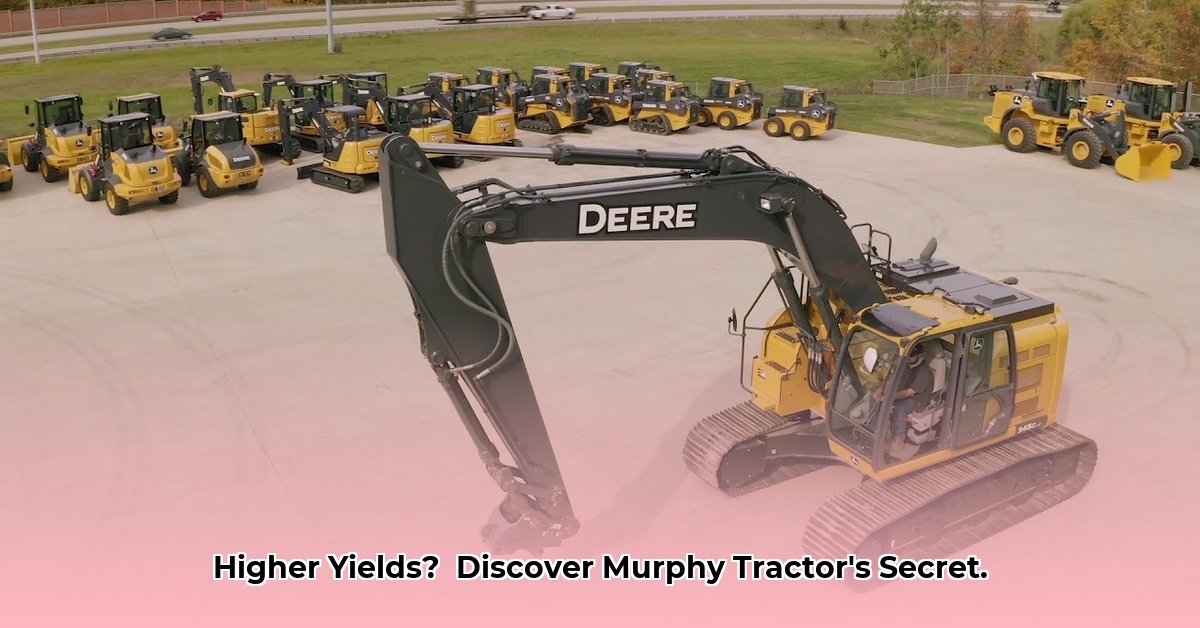
Murphy Tractor and Sustainable Farming in Kansas City
Want to increase your farm's profitability while minimizing your environmental impact? Sustainable agriculture practices offer a pathway to achieving both. Although specific details on Murphy Tractor's direct involvement in sustainable agriculture initiatives are limited, this guide focuses on actionable steps Kansas City area farmers can take, exploring how Murphy Tractor's equipment could potentially support these efforts. We'll examine practical strategies, and share real-world examples of local farmers successfully implementing these techniques.
Assessing Your Farm's Sustainability: A Self-Check
Before implementing changes, assess your current practices. This self-assessment helps pinpoint areas for improvement and informs your transition towards sustainability.
Consider these key aspects:
Water Management: What irrigation methods do you use (e.g., sprinklers, drip irrigation)? Could rainwater harvesting supplement your water supply? Efficient irrigation conserves water and reduces costs. Are you maximizing your water efficiency, or is there room for improvement?
Soil Health: Describe the condition of your soil. Is it healthy, compacted, or prone to erosion? Soil health directly impacts crop yields and overall farm productivity. How would you rate your soil health on a scale of 1-5, with 5 being the healthiest?
Pest and Disease Management: What methods do you currently employ (chemical sprays, natural predators, crop rotation)? Integrated Pest Management (IPM) uses the least harmful methods to control pests and diseases, reducing environmental impact and cost. What percentage of your pest control relies on chemical pesticides?
Nutrient Management: How do you manage fertilization? Soil testing helps determine the precise nutrient needs of your crops, avoiding over-fertilization and saving money. Are you testing your soil regularly to optimize nutrient application?
Crop Management: Do you use cover crops or crop rotation? Cover crops improve soil health and prevent erosion; crop rotation diversifies nutrients and reduces pest buildup. Are your current crop management strategies contributing to soil health and long-term productivity?
Practical Steps for Sustainable Farming in Kansas City
Sustainable practices enhance profitability and environmental stewardship. These steps are tailored to the Kansas City area’s climate and agricultural context.
1. Soil Health Improvement:
- No-Till Farming: Minimize soil disturbance by reducing or eliminating tillage. This improves soil structure, water retention, and organic matter content. Think of it as letting the soil breathe!
- Cover Cropping: Plant cover crops (e.g., rye, clover) between main crops to prevent erosion, suppress weeds, and add nutrients to the soil. These are like nature’s soil conditioners!
- Crop Rotation: Rotate different crops to break pest cycles, improve soil health, and optimize nutrient utilization. Diversifying your crops is key!
2. Water Management Optimization:
- Precision Irrigation: Utilize technologies like drip or micro-sprinklers to deliver water directly to plant roots, minimizing water waste. Every drop counts!
- Rainwater Harvesting: Collect rainwater for irrigation, reducing reliance on groundwater and potentially lowering costs. This is a win-win for your farm and for water conservation!
3. Integrated Pest Management (IPM):
- Implement IPM strategies to monitor pest and disease levels, and use targeted, environmentally-friendly control methods. This minimizes your reliance on harmful chemicals.
4. Nutrient Management Enhancements:
- Soil Testing: Regularly test your soil to determine nutrient deficiencies and apply fertilizer precisely. This helps prevent nutrient runoff and saves money on unnecessary fertilizer.
- Organic Fertilizers: Consider utilizing organic options like compost or manure to enhance soil fertility while reducing reliance on synthetic fertilizers. Nature’s own fertilizer!
Resources and Support for Kansas City Farmers
Numerous resources can assist you in your transition to sustainable agriculture:
- Local Agricultural Extension Offices: Provide localized expertise and support for sustainable farming practices specific to the Kansas City area. They are your local agricultural knowledge center.
- USDA and State Programs: Offer financial assistance and incentives for adopting sustainable agricultural techniques. Check for available grants and subsidies.
- Non-profit Organizations: Many non-profits support sustainable agriculture through workshops, training, and resources. Explore local and national organizations.
- Equipment Suppliers (like Murphy Tractor): Consult with equipment providers to explore options for machinery suited for sustainable practices. Equipment can significantly impact efficiency and long-term cost.
Overcoming Challenges in Transitioning to Sustainable Practices
The shift to sustainable agriculture can present challenges. Let’s tackle them proactively:
| Challenge | Solution |
|---|---|
| Higher Upfront Investment | Explore government grants, loans, or leasing options for new equipment. |
| Learning Curve | Participate in workshops, online courses, consult experienced farmers. |
| Market Access for Produce | Network with local restaurants, farmers' markets, and food cooperatives. |
| Increased Labor Intensity | Investigate labor-saving technologies and explore efficient practices. |
Remember, the transition to sustainable agriculture is a journey, not a race. Small, consistent changes can yield significant long-term benefits for your farm, the environment, and your community. Start small, build momentum, and enjoy the rewards of a sustainable and profitable farm.